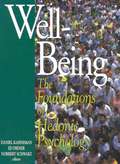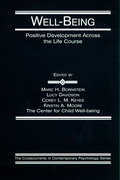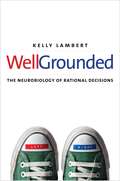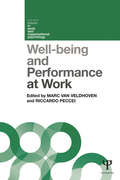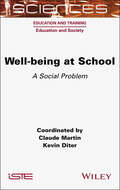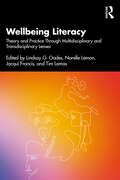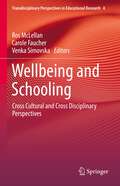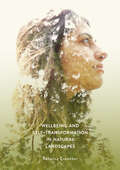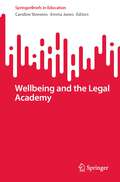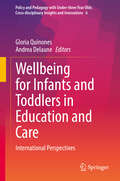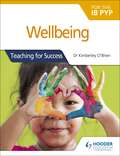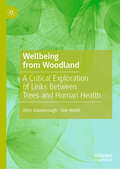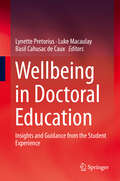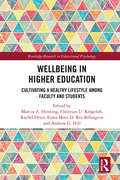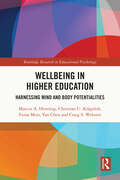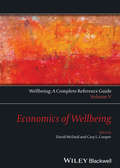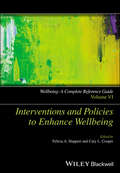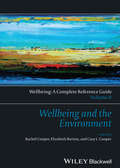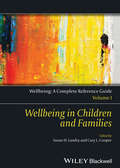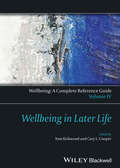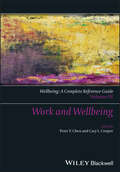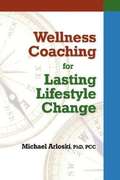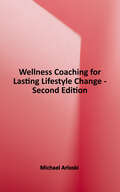- Table View
- List View
Well-Being: Foundations of Hedonic Psychology
by Daniel Kahneman Norbert Schwarz Edward DienerThe nature of well-being is one of the most enduring and elusive subjects of human inquiry. Well-Being draws upon the latest scientific research to transform our understanding of this ancient question. With contributions from leading authorities in psychology, social psychology, and neuroscience, this volume presents the definitive account of current scientific efforts to understand human pleasure and pain, contentment and despair. The distinguished contributors to this volume combine a rigorous analysis of human sensations, emotions, and moods with a broad assessment of the many factors, from heredity to nationality, that bear on our well-being. Using the tools of experimental science, the contributors confront the puzzles of human likes and dislikes. Why do we grow accustomed and desensitized to changes in our lives, both good and bad? Does our happiness reflect the circumstances of our lives or is it determined by our temperament and personality? Why do humans acquire tastes for sensations that are initially painful or unpleasant? By examining the roots of our everyday likes and dislikes, the book also sheds light on some of the more extreme examples of attraction and aversion, such as addiction and depression. Among its wide ranging inquiries, Well-Being examines systematic differences in moods and behaviors between genders, explaining why women suffer higher rates of depression and anxiety than men, but are also more inclined to express positive emotions. The book also makes international comparisons, finding that some countries' populations report higher levels of happiness than others. The contributors deploy an array of methods, from the surveys and questionnaires of social science to psychological and physiological experiments, to develop a comprehensive new approach to the study of well-being. They show how the sensory pleasures of the body can tells us something about the higher pleasures of the mind and even how the effectiveness of our immune system can depend upon the health of our social relationships.
Well-Being: Positive Development Across the Life Course (Crosscurrents in Contemporary Psychology Series)
by Corey L. M. Keyes Marc H. Bornstein Lucy Davidson Kristin A. MooreThis volume derived from original presentations given at a conference in Atlanta, Georgia, under the auspices of the Center for Child Well-Being. Scholars, practitioners, public health professionals, and principals in the child development community convened to address a science-based framework for elements of well-being and how the elements might be developed across the life course. Integrating physical, cognitive, and social-emotional domains, Well-Being is the first scientific book to consider well-being holistically. Focusing on a set of core strengths grouped within these three domains, the book also includes a fourth section on developmental strengths through adulthood that broadly examines a continuum of health and development, as well as transitions in well-being. This volume takes a developmental perspective across the life course, describing foundational strengths for well-being--the capacities that can be actively developed, supported, or learned. These foundational strengths--problem solving, emotional regulation, and physical safety--are the positive underpinnings of early child health and development, as well as ongoing well-being across the life course. Working together and blending their respective disciplinary perspectives and expertise, 53 experts in psychology, sociology, child development, and medicine have contributed to the book.
Well-Grounded: The Neurobiology of Rational Decisions
by Kelly LambertA neuroscientist reveals unique aspects of decision making and the best strategies for protecting and enhancing the brain’s ability to navigate life’s uncertainties Contingency calculations—the ability to predict the outcomes of decisions and actions—are critical for survival and success. Our amazing brains continually process past and current experiences to enable us to make the most adaptive choices. But when the brain’s information systems are compromised—by such varying conditions as drug addiction, poverty, mental illness, or even privilege—we can lose the ability to arrive at informed decisions. In this engaging book, behavioral neuroscientist Kelly Lambert explores a variety of the modern factors that can lead to warped neural processing, or distorted realities she terms “brain bubbles.” Individuals who define success in terms of creature comforts and immediate gratification, for instance, may interact less with the physical and social world and thereby dull their ability to imagine varied contingency scenarios. The author underscores how continuous, meaningful, and well-grounded experiences are required if we are to make the best decisions throughout our lives.
Well-being and Performance at Work: The role of context
by Marc Van Veldhoven Riccardo PecceiPsychology has been interested in the well-being and performance of people at work for over a century, but our knowledge about both issues, and how they relate to each other, is still evolving. This important new collection provides new understandings on what it means to work productively while also feeling happy, socially related and healthy. Including contributions from a range of international experts, the book begins with a conceptual framework for understanding both concepts, before showing how a variety of different contexts, both organizational and personal, impact upon well-being and performance. The book includes chapters on specific job roles, from creative work to service positions, as well as the importance of HR policies and how the individual worker can determine their own well-being and performance. Also featuring a chapter on researching this fascinating area, Well-being and Performance at Work will be essential reading for all students and researchers of organizational or occupational psychology, HRM and business and management. It is also hugely relevant for any professionals interested in the productivity and well-being of their organizations.
Well-being and Wellness: Psychosocial Risk Management
by Tony Boyle Fiona CharltonWell-being and Wellness: Psychosocial Risk Management is a companion to Health and Safety: Risk Management that describes the techniques and background knowledge for preventing injury and ill health in the workplace. The new book instead describes the techniques and background knowledge for preventing impairment of worker well-being and wellness.These techniques differ from those required for the prevention of injury and ill health because of the need to take into account individual differences in susceptibility to psychosocial risk sources, and the fact that psychosocial risk sources can provide opportunities as well as threats. The book is divided into two parts: Part I describes the required background knowledge, including the nature of psychosocial harms to individuals, what can trigger these harms, and what can be done to mitigate these harms, and also deals with the necessary psychological background and the role of individual differences in reactions to psychosocial risk sources. Part II describes an outline psychosocial management system based on the ISO 45001 specification and the guidance in ISO 45002 and ISO 45003. However, the nature of the psychosocial risk sources being dealt with means that the ISO 45001 requirements must be extended in a number of ways, for example, by having threat and opportunity assessment, rather than risk assessment.Written primarily for OH&S professionals who wish to extend the scope of their management system to include well-being and wellness issues, the book is also directly beneficial to human resources (HR) professionals who have the responsibility for managing psychosocial hazards such as bullying and harassment. Additionally, it can be understood and applied by managers in all sectors who want to improve the well-being and wellness of their team, and it will be a relevant reading for students on OH&S, HR, or management courses.
Well-being at School: A Social Problem (ISTE Consignment)
by Claude Martin Kevin DiterIn recent decades, children’s well-being, particularly at school, has become a major political and academic issue that has gained importance both in public policy and in the social sciences. Well-being at School uncovers and discusses the different ways in which school well-being has been defined and evaluated, by outlining the international and interdisciplinary state of the art. It presents recent and diversified empirical evidence in different European and non-European countries, which bring together perspectives that have often been arbitrarily and artificially opposed in the literature: objective well-being versus subjective well-being; adult-centered perspective versus child-centered perspective; and analysis of family determinants versus analysis of school determinants of child well-being. This book’s originality lies in simultaneously considering the multiple dimensions of children’s well-being at school and understanding how these different determinants interact and combine, depending on the (geographical, social and family) contexts in which the children live.
Wellbeing Literacy: Theory and Practice Through Multidisciplinary and Transdisciplinary Lenses
by Lindsay G. Oades Tim Lomas Narelle Lemon Jacqui FrancisIn this groundbreaking collection, editors Lindsay G. Oades, Narelle Lemon, Jacqui Francis, and Tim Lomas explore wellbeing literacy—the capability to understand and effectively use wellbeing language to enhance flourishing for oneself, others, and society. Drawing together international scholars across diverse disciplines, this volume examines how intentional communication about wellbeing serves as a critical mechanism for personal and collective thriving.Moving beyond simplistic approaches to wellbeing, the contributors investigate how wellbeing literacy functions as a relational, contextual, and holistic capability that bridges individual experience with broader social systems. Chapters examine wellbeing literacy across different life domains, cultural contexts, and developmental stages, offering both theoretical frameworks and practical applications.This pioneering work challenges readers to consider: How does wellbeing literacy manifest in various contexts? What role does it play in policy development? How might it serve as a lever for social change? Through multimodal and interdisciplinary perspectives, the collection illuminates the dynamic interplay between language, knowledge, and skills that enable flourishing across individual, communal, and systemic levels.Essential reading for researchers, educators, and practitioners seeking innovative approaches to fostering wellbeing in an increasingly complex world.
Wellbeing and Schooling: Cross Cultural and Cross Disciplinary Perspectives (Transdisciplinary Perspectives in Educational Research #4)
by Venka Simovska Carole Faucher Ros McLellanCollectively, the research presented in this book revisits, challenges, and rearticulates taken-for-granted wellbeing conceptualisations, policies and intervention frameworks, as critical discussion of wellbeing in relation to children and young people from a variety of socio-cultural, political, and economic settings is still relatively sparse. The contributions work synergistically to generate a sophisticated understanding of children’s wellbeing while introducing fresh and context-sensitive approaches. Pre-conceived and taken-for-granted notions of wellbeing are problematised through four sections in (i) Re-examining conceptualisations of wellbeing in educational research and policy; (ii) Focusing on School environments, schooling, and wellbeing; (iii) Examining the significance of cultural contexts; and (iv) Amplifying children's voices. The objective is to help generate new ways of researching and thinking about wellbeing and schooling, that transcend monocultural, monodisciplinary and monomethodological strategies. The book aims to stimulate further theoretical and empirical research, as well as development of effective policies and school interventions which nuance rather than reduce complexity of both education and wellbeing.
Wellbeing and Self-Transformation in Natural Landscapes
by Rebecca CrowtherThis book explores how natural landscapes are linked to positive mental wellbeing. While natural landscapes have long been represented and portrayed as transformative, the link to mental wellbeing is an area that researchers are still aiming to comprehend. Accompanying five groups of people to rural Scotland, the author considers individual, external and group motivations for journeying from urban environments, examining in what ways these excursions are personally and socially transformative. Far more than traversing mere physical boundaries, this book illustrates the new challenges, experiences, territories and cultures provided by these excursions, firmly anchored in the Scottish countryside. In doing so, the author questions the extent to which people’s own narratives link to the perception that the outdoors are positively transformative – and what indeed does have the power to influence transformation. Grounded in extensive qualitative research, this contemplative and ethnographic book will be of interest and value to students and scholars of the outdoors and its connection to wellbeing.
Wellbeing and the Legal Academy (SpringerBriefs in Education)
by Emma Jones Caroline StrevensThis book provides a novel contribution to the wider bodies of literature on student and academic wellbeing by including a series of rich and nuanced discussions of specific aspects of the wellbeing of legal academics. It contains original research contributions on this topic drawing on insights from law, education and psychology and throws a spotlight on an emerging field of interest. In particular, it focuses attention on the need to understand the implications of workload, communication, competence, and community for academic wellbeing with the collection providing insight as to the amelioration of stress linked to these themes. Reference will be made to the key factors which influence each of these themes, such as the neo-liberal academy, the contours and staffing of the law school, the impact of COVID-19 and the role of values and ethics. Relevant theoretical perspectives relating to these themes, including self-determination theory and the notion of an ethic of care, will also be discussed.
Wellbeing for Infants and Toddlers in Education and Care: International Perspectives (Policy and Pedagogy with Under-three Year Olds: Cross-disciplinary Insights and Innovations #6)
by Gloria Quinones Andrea DelauneThis collection explores key issues related to infant and toddler wellbeing, offering diverse international perspectives on how wellbeing is culturally understood. Scholars from Drawing from Australia, Aotearoa (New Zealand), Brazil, Greece, Norway, Portugal and the UK present local conceptualizations that contribute to a broader, global understanding of wellbeing. The international contributors examine wellbeing as a crucial construct, emphasising the importance of relationships, health, emotions, imagination, and professional practice in infant-toddler education. Their research covers various topics, including transitions, peer relationships, love, interactions with objects and environments, conceptualisations of time, pedagogical weaving, Indigenous knowledge, and intra-connectedness. This book highlights the significance of relationships—between people, places, objects, and time—in shaping wellbeing. It challenges readers to reconsider wellbeing as both central to pedagogy and deeply interconnected with humans, non-humans, and vibrant environments. Drawing on diverse theoretical frameworks and research projects, the collection offers rich, multifaceted insights into wellbeing across varied contexts.
Wellbeing for the IB PYP: Teaching for Success
by Dr Kimberley O'BrienTeach for success and implement effective strategies to create flexible, inviting and intentional learning spaces - essential for supporting physical and emotional wellbeing. - Offers guidance on how to support emotional wellbeing with dedicated chapters on Mindfulness, anxiety and stress and the importance of wellbeing and PSEL. - Helps develop fully rounded and responsible learners with exploration of the lB Learner Profile and ATL skills of social, communication and self-management skills with case studies and Dr Kimberley's Top 5 Tips. - Provides a collaborative approach to wellbeing with storybooks (PYP Friends) and workbooks (PYP ATL Skills Workbooks) that can be used alongside this resource to develop your students social and emotional wellbeing.
Wellbeing for the IB PYP: Teaching for Success
by Kimberley O'BrienTeach for success and implement effective strategies to create flexible, inviting and intentional learning spaces - essential for supporting physical and emotional wellbeing. - Offers guidance on how to support emotional wellbeing with dedicated chapters on Mindfulness, anxiety and stress and the importance of wellbeing and PSEL. - Helps develop fully rounded and responsible learners with exploration of the lB Learner Profile and ATL skills of social, communication and self-management skills with case studies and Dr Kimberley's Top 5 Tips. - Provides a collaborative approach to wellbeing with storybooks (PYP Friends) and workbooks (PYP ATL Skills Workbooks) that can be used alongside this resource to develop your students social and emotional wellbeing.
Wellbeing from Woodland: A Critical Exploration of Links Between Trees and Human Health
by Sue Waite Alice GoodenoughThis book provides a framework for understanding the components of woodland wellbeing. Based around the collaborative project, Good from Woods, the book spotlights multiple case studies to explore how wellbeing and health are promoted in woodland settings and through woodland inspired activity. It illustrates forms of wellbeing through real examples of woodland practice and draws out implications for the design of programmes to support health and wellbeing across different client groups. Chapters discuss health and wellbeing from a variety of perspectives such as psychological, physical, social, emotional and biophilic wellbeing.The book will be of great practical use to commissioners, providers and users of woodland based activity who want to take a deeper look into how trees, woods and forests support human health and happiness, as well as of interest to academics and students engaged in research in outdoor activities, urban forestry and natural health and wellbeing.
Wellbeing in Doctoral Education: Insights and Guidance from the Student Experience
by Lynette Pretorius Luke Macaulay Basil Cahusac de CauxThis book offers a range of personal and engaging stories that highlight the diverse voices of doctoral students as they explore their own learning journeys. Through these stories, doctoral students call for an academic environment in which the discipline-specific knowledge gained during their PhD is developed in concert with the skills needed to maintain personal wellbeing, purposely reflect on experiences, and build intercultural competence. In recent years, wellbeing has been increasingly recognised as an important aspect of doctoral education. Yet, few resources exist to help those who support doctoral students. Wellbeing in Doctoral Education provides a voice for doctoral students to advocate for improvements to their own educational environment. Both the struggles and the strategies for success highlighted by the students are, therefore, invaluable not only for the students themselves, but also their families, their social networks, and academia more broadly. Importantly, the doctoral students’ stories should be a clarion call for those in decision-making positions in academia. These narratives demonstrate that it is imperative that academic institutions invest in providing the skills and support that doctoral students need to succeed academically and flourish emotionally.
Wellbeing in Higher Education: Cultivating a Healthy Lifestyle Among Faculty and Students (Routledge Research in Educational Psychology)
by Marcus A. Henning Christian U. Krägeloh Rachel Dryer Fiona Moir Rex Billington Andrew G. HillAcademic staff and students within higher education settings are confronted by a learning environment that is academically stimulating, informative, career-focused and socially rich, which can be intensely competitive and highly charged. Within this learning environment, academic staff and students are often at risk of compromising their wellbeing in their pursuit of academic excellence. This book provides an examination of the key areas that are important to the sustenance of wellbeing within higher education settings, with a view to promoting healthy learning environments. The chapter authors are predominantly working in the Asia-Pacific rim, but the book also includes more universal perspectives. The synthesis of the issues covered in the book is crucial to the understanding of higher education as not only an environment for gaining knowledge and skills relevant for success in academic and career domains, but also as an environment for developing socially adept and authentic communication skills. The ideas presented in this book will further assist academic staff and students to consider ways to more fully participate in their learning environment so that they can optimize their valuable contributions to the professional communities they serve.
Wellbeing in Higher Education: Harnessing Mind and Body Potentialities (Routledge Research in Educational Psychology)
by Yan Chen Marcus A. Henning Christian U. Krägeloh Fiona Moir Craig S. WebsterDrawing on holistic research and professional practice, this book provides rich empirical, scientific, and clinical lenses to the discourse on wellbeing in higher education. The authors have appraised the underlying, conceptual, empirical, and applied nature of existing mind-body programmes often utilized to cultivate wellbeing (e.g., seated meditation, yoga, Taijiquan, Pilates, Feldenkrais, biofeedback, and the Alexander technique). Higher education is touted as a sector that develops new ideas for the wider community as well as ensuring students are provided with the skills, knowledge, and attitudes to positively contribute to the wider community. Within this setting, there are numerous benefits (e.g., attaining a reputable qualification), but there are also risks (e.g., stressors associated with expectations). To ensure the higher education setting is a place of wellbeing in addition to achievement, several strategies are promoted to assist staff and students whilst working and studying. Chapters offer clear implications for research and practice, and explore effective strategies for enhancing wellbeing for students and staff. The integrative mind-body programmes have considerable potential for developing wellbeing in the higher education settings. As such, this book will appeal to academics and researchers in the higher education sector, including scholar-practitioners, and teacher educators.
Wellbeing: A Complete Reference Guide, Economics of Wellbeing
by Cary L. Cooper David McDaidPart of the six-volume Wellbeing: A Complete Reference Guide, this is a comprehensive look at the economics of wellbeing with coverage of history, research, policy, and practice. Examines the challenges inherent in studying and measuring wellbeing from an economic perspective Discusses strategies and interventions to improve wellbeing across the lifespan and in different settings Addresses the potential economic benefits for governments and policymakers of actively investing in initiatives to improve wellbeing, from the workplace to the home to the natural environment Emphasizes the need to strengthen the evidence base for the economics of wellbeing and improve methods for translating research into policy and practice
Wellbeing: A Complete Reference Guide, Interventions and Policies to Enhance Wellbeing
by Cary L. Cooper Felicia A. HuppertUsing an evidence-based approach and case studies from a wide range of life domains, Interventions and Policies to Enhance Wellbeing examines the most successful existing strategies to promote wellbeing and mental health. Discusses the results of the latest research in the science of wellbeing and their implications for improved learning, creativity, productivity, relationships, and health Covers interventions for individuals across the lifespan, as well as those for organizations, communities, and entire populations Looks at policy initiatives and approaches with a focus on the integration of new technology and the role of the media Part of the six-volume Wellbeing: A Complete Reference Guide, which brings together leading research from across the social sciences
Wellbeing: A Complete Reference Guide, Wellbeing and the Environment
by Cary L. Cooper Rachel Cooper Elizabeth BurtonPart of the six-volume Wellbeing: A Complete Reference Guide, this volume examines the ways in which the built environment can affect and enhance the wellbeing of society. Explores the effects of environment on wellbeing and provides insight and guidance for designing, creating, or providing environments that improve wellbeing Looks at the social and health issues surrounding sustainable energy and sustainable communities, and how those connect to concepts of wellbeing Brings the evidence base for environmental wellbeing into one volume from across disciplines including urban planning, psychology, sociology, healthcare, architecture, and more Part of the six-volume set Wellbeing: A Complete Reference Guide, which brings together leading research on wellbeing from across the social sciences
Wellbeing: A Complete Reference Guide, Wellbeing in Children and Families
by Cary Cooper Susan H. LandryThis is a wide-ranging look at the factors which positively and negatively affect the wellbeing of children and families. Discusses core developmental competencies for later life, the role of the family, the impact of different settings, and factors associated with lower levels of wellbeing Brings together the latest research from leaders in the field of child development Outlines important recommendations for families, caregivers, educators, social workers, and policymakers to assure and increase child wellbeing Part of the six-volume Wellbeing: A Complete Reference Guide, which brings together leading research from across the social sciences
Wellbeing: A Complete Reference Guide, Wellbeing in Later Life
by Cary L. Cooper Thomas B. L. KirkwoodWellbeing in Later Life uses the latest research from a variety of disciplines to address and correct common myths and misconceptions about aging. Covers topics ranging from biological mechanisms that affect aging to lifestyle, attitudes, and social factors Examines the challenges of humanity’s increasing life expectancy and includes recommendations for maintaining and enhancing wellbeing in later life Makes meaningful connections between research and practice to link aspects of aging which have previously been considered separate Part of the six-volume Wellbeing: A Complete Reference Guide, which brings together leading research from across the social sciences
Wellbeing: A Complete Reference Guide, Work and Wellbeing
by Cary L. Cooper Peter Y. ChenPart of the six-volume reference set Wellbeing: A Complete Reference Guide, this volume is a comprehensive look at wellbeing in the workplace at organizational, managerial, and individual levels. Discusses the implications of theory and practice in the field of workplace wellbeing Incorporates not only coverage of workplace stress in relation to wellbeing, but also aspects of positive psychology Explores the role of governments in promoting work place well being Part of the six-volume set Wellbeing: A Complete Reference Guide, which brings together leading research on wellbeing from across the social sciences Topics include work-life balance; coping strategies and characters of individuals; characteristics of workplaces and organizational strategies that are conducive to wellbeing; and many more
Wellness Coaching for Lasting Lifestyle Change
by Michael ArloskiFor the first time the principles of wellness promotion and personal life coaching are brought together in one volume. Guided by his long experience as a wellness coach, Dr. Arloski blends the wisdom of the coaching profession to bring us an easy-to-use training tool perfect for: wellness professionals, professional coaches, managers, EAP professionals, counselors, and wellness educators. The coaching processes outlined in the book will help you work with your clients to empower them to draw on his or her own abilities and resources to make lasting changes for better health.
Wellness Coaching for Lasting Lifestyle Change
by Michael ArloskiGuided by his long experience as a wellness coach, Dr. Arloski blends the wisdom of the wellness field and the proven processes of the coaching profession to bring us an easy-to-use training tool, perfect for wellness professionals, life coaches, disease management professionals, wellness coach training, EAP professionals and therapists.
